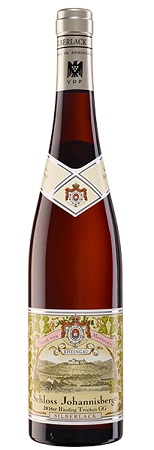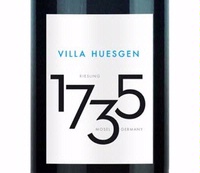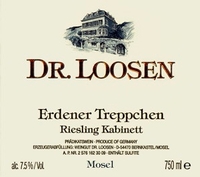($75):  Schloss Johannisberg, whose Riesling planting started in 1719, is thought to be the oldest Riesling producer in the world. (The first documented wine harvest from the site itself was a roughly a thousand years earlier, in 817.) The estate grows only Riesling, yet makes many different wines depending on where in the vineyard the grapes grow and when they are harvested. … Read more
Schloss Johannisberg, whose Riesling planting started in 1719, is thought to be the oldest Riesling producer in the world. (The first documented wine harvest from the site itself was a roughly a thousand years earlier, in 817.) The estate grows only Riesling, yet makes many different wines depending on where in the vineyard the grapes grow and when they are harvested. … Read more
Category Archives: Germany
Villa Huesgen, Mosel (Germany) Riesling “1735” 2016
($20, Quintessential):  The problem with Riesling is the “S” word — sweet. I can’t remember the times people have told me they’d never order a Riesling because it’s sweet. Well, some are and some aren’t. Sadly, it’s hard to tell just from looking at the label because even some labeled “dry” aren’t. … Read more
The problem with Riesling is the “S” word — sweet. I can’t remember the times people have told me they’d never order a Riesling because it’s sweet. Well, some are and some aren’t. Sadly, it’s hard to tell just from looking at the label because even some labeled “dry” aren’t. … Read more
Weingut Robert Weil, Kiedrich Gräfenberg (Rheingau, Germany) Riesling Auslese 2009
($85, Loosen Bros USA): This is a marvelous dessert wine. It’s sweet, but certainly not sugary or cloying. What amazes is the perfect, I mean perfect, balance of apricot skin tinged sweetness and riveting acidity. It’s so invigorating you hardly realize it’s sweet.… Read more
Weingut Robert Weil, Rheingau (Rheingau, Germany) Riesling Spätlese Kiedrich Gräfenberg 2010
($63, Loosen Bros, USA): This is classic German Riesling, combining ripe peach-like notes with racy invigorating acidity. Despite the ripe fruitiness indicated by the Spätlese indication (late harvest), its acidity makes it a lovely match for roast pork, sushi, and spiced Asian fare. … Read more
Weingut Baron Knyphausen, Rheingau (Germany) Riesling Kabinett “Baron K” 2011
($18): The trend over the years among top German producers has been to simplify the label by omitting the village and vineyard and just informing the consumer of the region. Fortunately in this instance, Knyphausen has not simplified the wine. It’s a classic Rheingau Riesling, lacey with captivating flavors of ripe white peaches and enough acidity to balance its fruitiness. … Read more
Weingut Johannishof, Rheingau (Germany) Riesling “Charta” 2011
($25, Valckenberg): Weingut Johannishof, Rheingau (Germany) Riesling “Charter” 2011 ($25, Valckenberg): Johannishof, a top-notch producer in the Rheingau, bottles a splendid array of single vineyard wines that never disappoint. This wine, in contrast, comes is a blend from several of their vineyards, not all of which are in the same villages. … Read more
Weingut Johannishof, Rheingau (Germany) Riesling “Charta” 2011
($25, Valckenberg): Weingut Johannishof, Rheingau (Germany) Riesling “Charter” 2011 ($25, Valckenberg): Johannishof, a top-notch producer in the Rheingau, bottles a splendid array of single vineyard wines that never disappoint. This wine, in contrast, comes is a blend from several of their vineyards, not all of which are in the same villages. … Read more
Schloss Saarstein, Mosel (Mosel Valley, Germany) Riesling, Spätlese 2011
($38, Valckenberg): Schloss Saarstein, a vineyard owned exclusively (a monopole) by the producer of the same name, is one of Germany’s finest properties. Located in the village of Serrig high above the steeply terraced Saar River, Schloss Saarstein consistently produces extraordinary wines. … Read more
Carl Graff, Graacher Himmelreich (Mosel Valley, Germany) Riesling Spätlese 2011
($17, Valckenberg): The Himmelreich vineyard is one of the best ones in the village of Graach, in the Middle Mosel. Graff’s 2011 Spätlese, the epitome of Middle Mosel Riesling, is lacy and delicate, yet persistent. It delivers a fabulous combination of minerality and lemony citrus notes balanced by zesty acidity. … Read more
J. J. Prüm, Mosel (Germany) Riesling Kabinett 2011
($24, Valckenberg): J. J. Prüm, one of the very best producers in the Mosel, makes a consistently stunning array of vineyard designated wines, such as Wehlener Sonnenuhr or Graacher Himmelreich. You can buy them year in and year out and never be disappointed. … Read more
Weingut August Eser, Rheingau (Germany) Riesling “Classic” 2010
($23, AP Wine Imports): The importer told me that the Classic moniker is an attempt by producers to replace the halbtrocken (half-dry) designation and indicate a drier style of Riesling. To my mind, this plethora of descriptors just muddies the already murky waters of trying to tell a consumer whether it’s a dry or sweet Riesling. … Read more
Dr. Loosen, Mosel (Germany) Dry Riesling “Red Slate” 2010
($14, Loosen Bros. USA): Happily, with Riesling surge’s in popularity in this country, we are seeing very high quality varietal wines–as opposed to vineyard designated ones–coming out of Germany, the place where Riesling excels. Germany always sent us great vibrant Riesling from specific sites, such as Piesporter Goldtröpfchen. … Read more
Dr. Loosen, Mosel (Germany) Riesling Kabinett Erdener Treppchen 2010
($20, Loosen Bros. USA):  Greet your holiday party guests with a glass of this Riesling and they will be thrilled. The village of Erden, situated in the Middle Mosel, the most exalted portion of the river’s vineyards, produces beautifully structured and precise wines, such as this one from one of the Mosel’s leading producers, Dr.… Read more
Greet your holiday party guests with a glass of this Riesling and they will be thrilled. The village of Erden, situated in the Middle Mosel, the most exalted portion of the river’s vineyards, produces beautifully structured and precise wines, such as this one from one of the Mosel’s leading producers, Dr.… Read more
Dr. Loosen, Mosel (Germany) Ürziger Würzgarten Spätlese 2010
($26, Loosen Bros. USA): The absence of a grape name on the label means, by law, the wine is made from Riesling, Germany’s most revered grape. And this is a quintessential Riesling from the steep banks of the Mosel River. Vibrant and fruity, a hint of sweetness amplifies its mineral aspect and makes it ideal as a stand-alone aperitif or with spicy Asian fare. … Read more
Two Princes, Nahe (Germany) Riesling 2010
($14, Valckenberg): Some German producers, responding to the criticism that their labels are too detailed and confusing, have simplified them. This label just tells us that it’s a Riesling from somewhere in the Nahe, a less well-known region that geographically lies just west of the Rheinhessen. … Read more
Schloss Saarstein, Saar (Germany) Riesling Serrig Schloss Saarsteiner Kabinett 2010
($26, Valckenberg): The vineyard, Schloss Saarstein, is located in the village of Serrig in the Saar Valley and is owned exclusively (a monopole) by Schloss Saarstein. Hence, there is confusion since the producer and the vineyard have the same name. However, let there be no confusion about the quality of the wine. … Read more
Graff Collection, Mosel (Germany) Riesling Spätlese Graacher Himmelreich 2010
($17): The wine merchant and importer, Valckenberg acquired the Carl Graff estate in 1969 and sold off the vineyards, but kept the rights to the name, eventually dropping the Carl. Hence, this is a négociant wine and shows just how good they can be when the selection is rigorous. … Read more
Maximin Grünhäuser, Mosel (Germany) Riesling Spätlese Abtsberg 2010
($37): The Maximin Grünhaus estate, one of Germany’s finest, has been owned exclusively by the von Schubert family since 1882. As a monopole, the usual German style of nomenclature–village followed by vineyard name–is not required. It’s composed of two reasonably sized (35-45 acres) south facing vineyards, Abtsberg and Herrenberg and one tiny (2.5-acre) one, Bruderberg, on the slopes of the Ruwer River just before it joins the Mosel. … Read more
Weingut Johannishof, Johannisberg (Rheingau, Germany) Riesling Kabinett ‘V’ 2010
($24, Valckenberg): Johannishof is one of the great producers in the Rheingau, where they own about 50 acres in prized vineyards, included Vogelsang. For unknown reasons they opt to call this wine V instead of putting the vineyard name on the label. … Read more
Von Kesselstatt, Piesport (Mosel, Germany) Riesling Kabinett Goldtropfschen 2010
($25, Valckenberg): It’s hard to miss with the wines from Von Kesselstatt, one of the leading producers in the Mosel. What’s amazing is how undervalued these wines remain. Goldtropfschen is one of, if not the most, acclaimed vineyards in Piesport, probably the Mosel’s most famous town. … Read more
Weingut Robert Weil, Rheingau (Germany) Riesling Trocken Kiedricher Gräfenberg 2009
($75, Loosen Brothers): Robert Weil’s name on a label is a guarantee of quality, since the winery is among Germany’s best. Trocken, or bone-dry wines, are not my favorite style of German Riesling, but this one wowed even a skeptic like myself. … Read more
Loosen Brothers, Mosel (Germany) Riesling “Dr. L” 2009
($11, Loosen Brothers USA): Dr. Loosen is a great German Riesling producer. This wine is their basic rendition, made from grapes grown at various points along the Mosel River. Wonderfully floral, the touch of sweetness is offset nicely by bracing acidity, which keeps it lively and prevents it from being cloying. … Read more
Bernhard Huber, Baden (Germany) Spatburgunder “Alte Reben” 2007
($80, Valckenberg): Consumers rarely think to turn to Germany for Pinot Noir (Spatburgunder), which makes this one all the more surprising. The color’s a bit light, but the flavors of dried cherries and savory notes are not, a result, no doubt, of the old vines (alte reben). … Read more
Weingut Josef Leitz, Rudesheimer Berg Schlossberg (Rheingau, Germany) Riesling Trocken Alte Reben 2009
($43, Michael Skurnik): Count me among those who love the detail of the German wine label. They may be long, but like this one, it tells you what you want to know before you pull the cork. The shortcut, of course, which works in this instance, is to just remember the producer. … Read more
